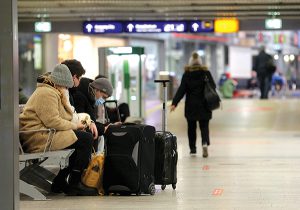Bloomberg
Germany spent about 42 billion euros ($48 billion) on a program to secure jobs threatened by the coronavirus pandemic.
A government program to pay most of an employee’s wages when they can’t work because of operational issues like lockdowns was worth the cost, Germany’s Labor Minister Hubertus Heil said in an interview with Tagespiegel.
“The alternative — namely allowing mass unemployment to return — would have been much, much more expensive
for Germany, socially and economically,†he said.
The program was just one of the measures the government in Berlin implemented to shield its economy from the crisis. Since the beginning of the pandemic, Germany has also paid out around 78 billion euros in aid to companies and extended 55.2 billion euros in loans.
Germany Tipped Into
Second Recession by Virus
Germany may have fallen into its second recession since the pandemic erupted as the omicron variant brought record infections that dragged down activity, according to the Bundesbank.
Output in Europe’s largest economy may decline “noticeably†in the first quarter, having already shrunk by 0.7% in the final three months of 2021, the central bank said on Monday in its monthly report.
“In contrast to previous waves of the pandemic, it’s not just the services sector that’s hit by restrictions and adapted behavior,†the Bundesbank said. Pandemic-related absence by workers will “markedly†hit activity in other areas too.
The recovery may be rapid, however. A business survey published earlier on Monday showed private-sector activity growing at the fastest pace in six months in February as manufacturers reported a further easing of supply bottlenecks.
Due to “very good†demand, the economy should rebound strongly in the spring as long as supply-chain pressures ease further and the pandemic continues to recede, according to the Bundesbank report.
Germany is moving past the peak of its latest virus outbreak, which has proved less lethal than previous waves.
The Bundesbank’s assessment of the current quarter contrasts with economists polled this month by Bloomberg, who see output gaining 0.4% from the previous three months.
German Economy Minister Robert Habeck has promised quick support for company efforts to invest to become climate neutral. In an interview with Handelsblatt, he vowed to require power companies to completely pass on savings directly to customers from the end of renewable power fees.
Russwurm said the price of emissions certificates is pushing up energy costs and that the government needs to react by cutting taxes and fees.
“The increase in energy costs is higher than at any point since the oil crisis of the 1970s,†he said.
Europe’s largest economy aims to lift most curbs by March 20, taking a more cautious approach than many of its neighbours. The move was agreed after talks with Chancellor Olaf Scholz and state leaders and comes just days after Germany posted record infection levels.
While the government rolls back public-health measures, it will continue to extend aid to businesses affected by the crisis. Companies that face labour shortages from Covid infections can continue to call on support to cover lost wages after March 31. Companies affected by supply-chain disruptions or other Covid-related issues can continue to ask for help until June.
 The Gulf Time Newspaper One of the finest business newspapers in the UAE brought to you by our professional writers and editors.
The Gulf Time Newspaper One of the finest business newspapers in the UAE brought to you by our professional writers and editors.
